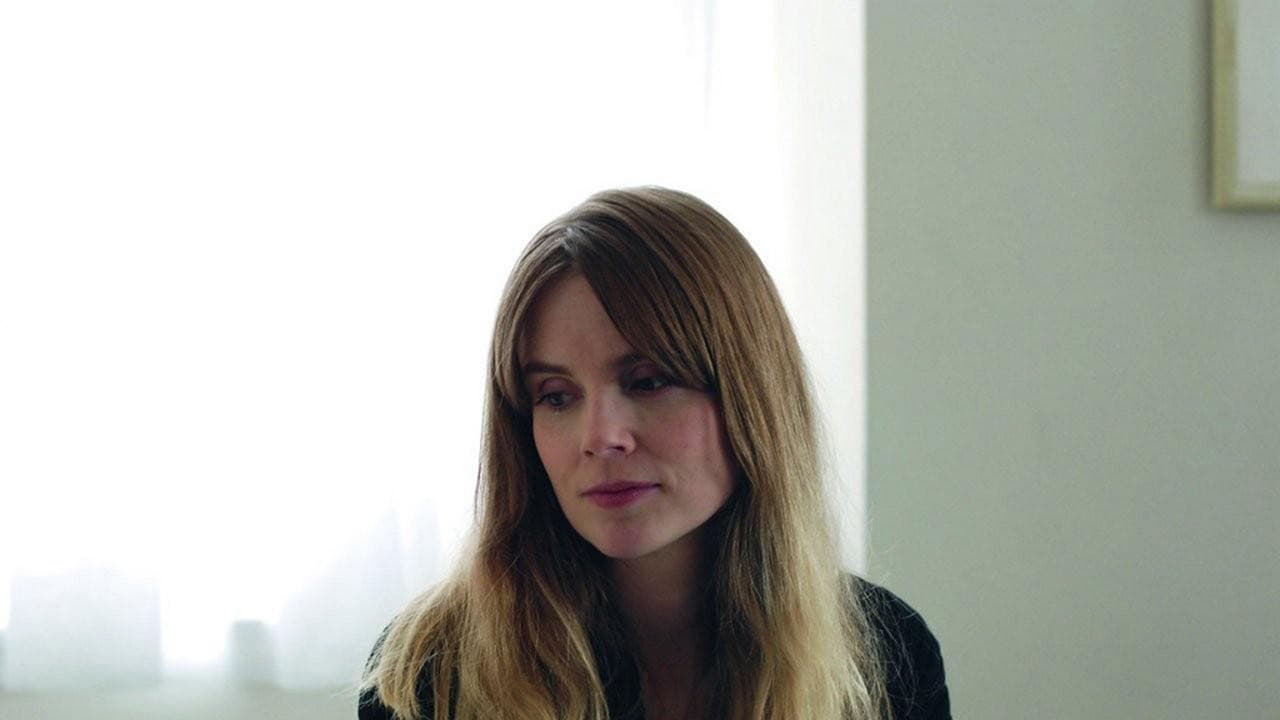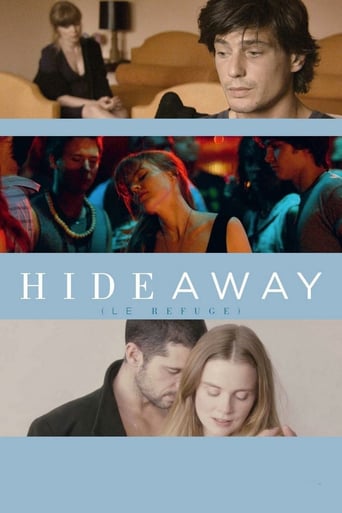SpecialsTarget
Disturbing yet enthralling
TrueHello
Fun premise, good actors, bad writing. This film seemed to have potential at the beginning but it quickly devolves into a trite action film. Ultimately it's very boring.
Bluebell Alcock
Ok... Let's be honest. It cannot be the best movie but is quite enjoyable. The movie has the potential to develop a great plot for future movies
Walter Sloane
Mostly, the movie is committed to the value of a good time.
dbdumonteil
The junkie atmosphere versus the bourgeois milieu the first sequences conjure up could lead the director into numbing Chabrol territory,but finally Ozon's innate narration sense keeps the film simple and direct.Chabrol's fans will probably notice the similarities between the beginnings of "Le Refuge " and "La Rupture" (1970):in both movies ,the young man of means runs away with a girl who comes from a much modest family ,then there's a bad trip;and the way the "mother-in-law" treats the girl recalls that of Michel Bouquet in the 1970 effort.When lil' brother comes to visit Mousse,we may fear a rehash of Irish's "I married a dead man" (filmed as "no man of her own" "J'ai Epouse Une Ombre" and "Mrs Winterbourne" ) but fortunately it is not : lil' brother is gay (the gay -or the lesbian- we find in every movie Ozon has made)and moreover ,he 's some kind of black sheep of the family (one sentence the mom said at the beginning is revealing "it's not him who should have died!" ;we only understand it halfway through the movie).That said ,and although the ending makes sense ,there's a tendency in the director's recent work to rest on his laurels .One sees little in "Le Refuge" of the taste for danger he displayed in earlier works such as "Sitcom" "Gouttes D'Eau Sur Pierres Brûlantes" or "Les Amants Criminels"
oOgiandujaOo_and_Eddy_Merckx
It's quite difficult to summarise what Le Refuge is about, there is a plot, it's linear, and quite simple, but there's nothing really generic in content, and it's not particularly dramatic either. Couldn't really call it anything other than an "emotion painting", beautifully shot, and well performed. The characters in the film are rather unlikeable, Mousse (Isabelle Carré) is a charismatic kidult heroin addict with a sharp tongue and propensity to sexual jealousy, unflappable Paul who somehow gets entangled with Mousse, has no sympathy with his brother's pained life and subsequent death. The background of high affluence that these two come from seems to be a seething psychological vipers nest from a wet dream of Freud.The story regards Mousse who manages to survive her lover when they both tuck into a bad batch of heroin. She is pregnant and now on methadone, taking refuge at the coast in an acquaintance's deserted property. The extremely handsome and gay Paul (the brother of her lover) turns up, but is full of sangfroid to the gills and becomes an object of unattainable lust for Mousse.One might say that the film is an unhaloed look at pregnancy. Mousse is fine with drinking alcohol and methadone for two, the film also looks at the erotic potential of the pregnant woman, as Mousse is propositioned by various men, and throughout she is quite unsentimental, as if she were a paid surrogate. I think that the camera-eye is not altogether disapproving, there is perhaps a feeling that in modern times preparations for a baby are preparations as if for the visit of a little emperor, with all the concomitant Freudian backlash.It feels a little dirty sometimes that there are questions that only the viewer of the film knows the answer to, as opposed to the characters. The characters are left to wonder why, for example, did Louis die and Mousse survive? I think as well that there are things left to the viewer's imagination, for example the story of Louis and Paul's parents, which begs a whole film in itself; there's a kind of pendulosity to the suggestions there that really make the film feel like a masterpiece.Visually I think there are some nice touches, this is the first time Ozon has filmed in digital, and he and the DP were playing around here. There's a psychological resonance when Mousse is at the beach on a bright summer day and a scene is played out with grafittoed breakwaters in the background that scream hazard as the water smashes into them. There's also a lovely shot at the beginning where a coruscating river reflects off a glass-fronted building.It's ultimately an extremely winsome tale of fallible characters. I think the fallibility is extremely well portrayed, these characters are fallible just like pretty much everyone who'll be watching the film. So I give the film a lot of points for humanity, as well as, by the way, for not having an ounce of fat at 88 minutes.For more excellent acting from Isabelle Carré in a "bad woman" role, you could do worse than watch Anna M. A note as well that this film could as seen a return to the aesthetics of Ozon's 52 minute thriller Regarde la mer, also about a disquieting movie starring a mother figure who frequents the French beaches.
film_ophile
While I don't agree w/ Chris Knipp's view that this boiled down to a vague glossy ad....I am thankful that he used words like lyrical and elegance , which caused me to see the movie tonight as part of the Boston MFA's annual French Film Festival. I am a big fan of Ozon. I don't know what it is about him, but I feel very simpatico with his sense of humor,and his gazings and subtle observations about humanity. There is this allowance for space in his serious films, space for the characters to feel and grow, and space for the audience to partake in this. I do not find that space flat or boring; rather, it has me fully engaged as a viewer. In this film I was surprised and very taken in by the mesmerizing spiritual nature of Louis-Ronan Choisy . I have not seen him before and he was quite wonderful to watch.He was so perfectly cast for this role. I have been quite taken in by Isabelle Carre before, but I think it was a shame that her character in this film was not able to play to the ethereal and quite 'saintly'persona she has exuded in other roles.I was hoping to get at least a glimpse of the (in-reality) pregnant Carre with that beatific presence that she can emanate.All in all, the relationship between the two of them, and the scene with her being verbally harangued by the guilt ridden woman on the beach, were enough to make me recommend this film. I found it not perfect;too many things unanswered character and plot wise, but still quite lovely, and it left me with a feeling, a mood, that I am still carrying.
Kristine Giluce
A film of a modest budget, a film made in the sunny Pays Basque and a film which captures a real pregnancy. As a matter of fact, The Refuge is "born" of this idea to film a pregnancy, and this movie benefits this particular occasion. But let's say it is not a typical idyllic portrayal of a pregnancy or of a pregnant woman. The only thing that may be idyllic, is the sun of the south of Europe. Otherwise, this is a capture of troubled lives and troubled personalities. The start of The Refuge is marked by a death by a drug overdose. Useful to say that the bunch of takes in beginning does not transmit even little of the richness of the future images of film. But who knows, maybe the cliché full drug taking scenes are there to underline the contrast. Anyways, the decease of the character of Louis, puts an ending to a love story - a very brief moment. Nevertheless, there is another story on the way and the principal figure of this film, Mousse, miraculously alive, carries it in her belly. And here begins the refuge where two characters, Paul and Mousse, try to figure out their lives. Paradoxically, these two lives are not so related as much as one can probably think, as they are put so close. Passing to the refuge in Basque Country, Ozon makes sure that the spectator draws a clear line in his mind by the change of tonalities – grim and gray for Paris and pastel and sunny for the south. Despite the posh ambiances of Paris surroundings and idyllic summer of southern Europe, the images speak generally of troubled lives. They portray a woman, struggling with the sudden solitude and a man, trying to find where exactly he belongs. The director puts on the screen a pregnancy that troubles the spectator more than the mother. Quite an ironic manipulation with those in front of screen – they experience the turbulence knowing that the heroine is still taking methadone and does not refuse alcohol or a night in club with music roaring loudly. But truly, it's all not about this. She is well aware of her pregnancy, but this is a different kind of pregnancy. It is not for the sake of it, it is for the sake of keeping the life. The big belly evokes the presence of Louis, who is gone and the presence of the baby, who hasn't yet arrived. It's nice to see, that director has found out, that pregnancy can be be showed as an instrument of portrayal or a link among other elements of the film. For example, it allows to grasp the personality of Mousse. It is like some sort of mourning which passes very silently, without hysterical and loud scenes. Like the way she is – very introvert and calm, keeping all the troubles inside; nevertheless the situation permits to see her desire for independence and stubborn nature. In addition, who would have thought, that giving different sexual orientations to the principal characters, permits so precisely to limit any kind of romance, even placing both in one, relatively isolated space and time. And even if Ozon lets happen something, it still is for the sake of the story, not for the comfort of spectators' expectations. Also, it has to be admitted, that Isabelle Carré looks beautiful and plays admirably the role of Mousse, in a way, living through two stories of one pregnancy.

